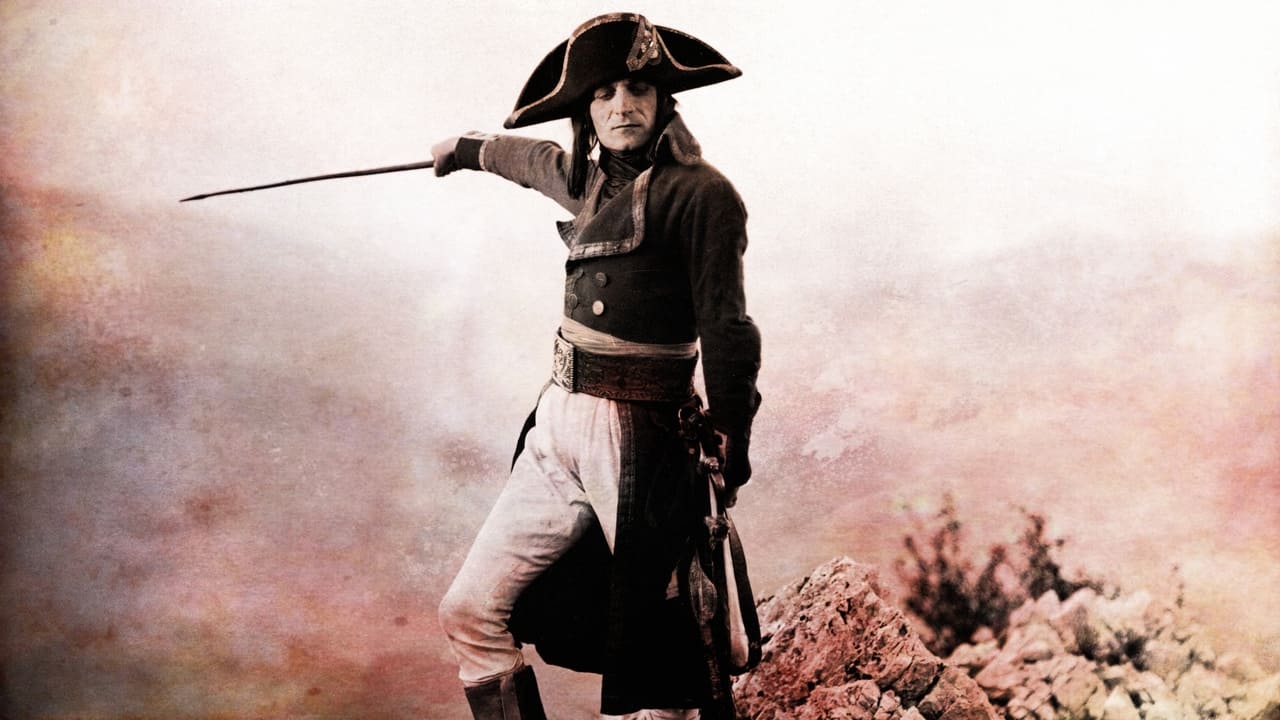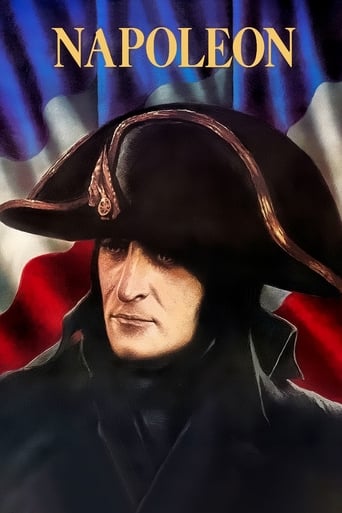

I thought I had entered a review, but I can not find it. . This movie came to Sacramento, California, as a premier in 1983 prior to my transferring to Germany. I do not know if it came with the new sound track, as I seem to recall that the piano down front was played, maybe only for the before the movie begins. I had difficulty with the costuming, as I was of the opinion that Josephine liked filmy dresses, so I thought the costuming was more 1890 than it should have been. But after watching the actors and actresses for a bit, the viewers get caught up into the beleiveability of each actor. One could only wonder what colorization would do for it. The final battle scenes were awe inspiring. The three screens tended to give a three dimensional effect, and let the audience be almost in the middle of the battle. As I recall in the write-up, the camera man tied his camera to a rope and spun it over his head, while on a horse to film those scenes. I do not understand why this film is not available to the public. I am unable to find a copy. Arne Sampe, Paul, Idaho,
... View MoreI saw this film in Los Angeles sometime in the 80's. I remember not being that thrilled to go see such a long "silent" film, but agreed to go because a friend of mine was playing in the live orchestra accompaniment and I wanted to be supportive. I was, to say the least, completely blown away. To this day, it remains the best film I have ever seen. Nothing compares with it. There were 3 screens with a mixture of film action, photographs and, of course, the live orchestra and, despite the length, it was utterly phenomenal. Until reading some of the comments here, I was unaware there was a controversy about the length, quality and musical score. In fact, in the years since I've seen this film, when discussions about movie favorites come up, I've always said this was my favorite film. Not once have I ever come across another person who's even heard of it, let alone seen it. Perhaps I need a higher brow version of friends and acquaintances...smile. On reflection, I would assume the version I saw must have been Coppola's. If this lesser restoration could blow me away, it would be a privilege and honor to see the more complete restoration. If it ever comes my way, believe me, I'll be first in line to see it. Should this epic travel in your direction, don't miss it. It is truly one of the finest films ever.
... View MoreI'm the first French user to write about the best French movie of the silent era.Even a poster from Slovenia wrote about it (he or she had a French relative).But no French .Part of the reason can be found in the fact that it has become almost impossible for the French to see Gance's work in its native land;my copy is the Coppola version,with English subtitles ,which is a bit amazing all the same.Believe it or not,it is never screened on French TV:about ten years ago ,it showed a digest "Napoleon et LA revolution" which essentially consisted of extracts of roughly part one;it's not available on DVD ,it has not been shown in movie theaters for years ;a lot of people know the existence of this film,few have seen a decent version,and less have seen the original version ,with Gance's dialogs - a work always loses something when translated in another language- The Coppola version is quite satisfying ,Carmine Coppola's music really enhances the phenomenal pictures and displays a good knowledge of the French culture:the original music often segues into French hymns (of course "La Marseillaise" which was written in 1792,but also 'Le Chant du Départ " as well as English anthems ("God save the king" and "rule Britannia" );revolutionary songs ("Ah ca Ira " -"Chanson des Sans -Culottes" - "La Carmagnole " ) are also present.Coppola sr also included French folk songs such as "Malborough S'En Va t En Guerre" or the obscure "La Chanson du Carillonneur" which is heard during the siege of Toulon .This "drummer song" which I sang at school (and never heard of afterwards)has several versions,one of them is about the appalling army of king Louis (I cannot tell which one" whose soldiers would bravely serve if he paid them well;that's really a smart idea to have included it in the soundtrack.On the other hand "Auprès de Ma Blonde" ,which Gance had selected to enhance the final on the "Triple Ecran" in Italy did not make the Coppola score.Technically,it's stating the obvious to write that Gance was very advanced ,using his camera in a way most (and in France all of them) did not start using before the talkies when they did.Most of basic filming precepts came into as being innovations on particular Gance techniques .He had begun experimentation long before 1927:the scene when Danton's,Robespierre 's and Saint-Just 's ghosts come back to "inspire " the hero to help lead the French on their way to freedom (which was a naive idea if you know -and of course you do-what Bonaparte will become later)directly comes from the wake of the dead from "J'Accuse" (1917).To think that this director used the split screen (scenes in the snow) and the triple screen (Italy).Nonetheless,the most impressive moment is the hero alone on his boat tossed by the raging sea ,while l'Assemblée is caught in the whirlwind too;a scene which was borrowed from Victor Hugo's "Quatre Vingt Treize " (93)"Napoleon" cast a giant shadow on the rest of Gance's work ;his two other silent major oeuvres "La Roue" and "j'Accuse" are still highly thought of,but it is considered polite to ignore most of his talkies.And he never stopped trying ;his first talkie was a sci fi movie ("La Fin du Monde" 1930) whereas almost all his colleagues stayed in the filmed stage production style.He continued his experiments with "Un Grand Amour de Beethoven" where he invented the "subjective" sound .He often partially failed for lack of means : for his remake of "J'Accuse " (1938) he had to use shots of "La Fin du Monde" .But until the very end he never produced anything mediocre:his last work "Cyrano and D'Artagnan" was in verse.If someone tells you there was nothing interesting in the FRench cinema before Bresson or- yuk !-Godard ,set him down with a DVD player for a screening of "Napoleon".It will blow his mind.About the actors Albert Dieudonné would play Napoleon again in Roger Richebé's fine comedy "Madame Sans -Gene" (1941)Gance told the young Suzanne Charpentier who played Violine (Toulon segment) she made him think of Poe's "Annabelle Lee" ;and she became Annabella .She would marry Tyrone Power.
... View MoreI saw this film in its restored original form, with 3 projectors for the triptych scenes, and with the original Arthur Honegger score played on one of the few surviving giant theater organs. It is still an unforgettable cinematic experience. Eisenstein and other Russian filmmakers were dazzled by Gance's technique when a print of the film found its way to Moscow. Gance re-edited Napoleon as a sound film in 1934, using the original actors to dub in the voices and adding some new scenes. The lip synch is perfect, because Gance (unlike most silent film directors)made his actors speak all their lines. The DVD (which is long overdue)should include both the silent and the sound versions of the film, and use Honegger's score. He was a major 20th Century composer, contemporary with Gance, who spent most of his career in France; so his music really belongs with the film.
... View More